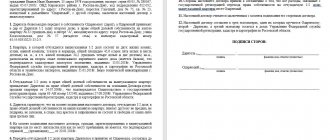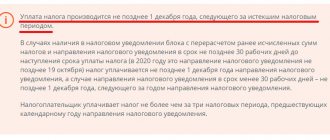Home » Housing disputes » How to transfer a share in an apartment to a relative, another shareholder, another person
11
The need to transfer a share (sale or donation) in an apartment to both close relatives and complete strangers often arises. This could be either a desire to “concentrate” all property ownership rights in the hands of one person, or a simple sale of part of the home in order to improve financial condition. Let us consider the features of this procedure in more detail.
Tax control
The Federal Tax Service controls these transactions more carefully, this is due to the high risk that the transaction will turn out to be imaginary, that is, it will be completed in derogation from the requirements for the real estate purchase and sale procedure established by law.
The tax office pays attention if a contract for the purchase/sale of housing is concluded between relatives. It may be that the property is re-registered to a relative, but the seller does not actually receive the money. This can be done, for example, to obtain a tax deduction or, in order to avoid paying taxes on the actual sale, a gift agreement is drawn up between close relatives.
A discovered imaginary transaction may be declared void in court. Payments received will need to be returned to the state.
Required documents
To conclude an agreement (regardless of its type), you need to prepare the following documents:
- Passports of the parties to the transaction.
- Permissions from other owners.
- Confirmation that the co-owners have refused to buy out the share.
- An extract from the Unified State Register of Real Estate confirming ownership (or another similar document).
- Permission from regulatory authorities (provided that the donor is a minor or incapacitated person).
In some cases, additional paperwork may be required, but this is the exception rather than the rule.
Receiving a tax deduction
There are nuances when buying real estate between relatives. As a standard, the buyer has the right to reimburse 13% of the income tax paid in the maximum established amount of 206 thousand rubles, as well as interest on the mortgage loan in the amount of up to 390 thousand. rub.
A special feature of concluding transactions is the legally established limitation on compensation payments. A tax deduction cannot be issued if the agreement is concluded between close relatives.
For example, a couple decided to buy an apartment from their husband’s sister. They are married, the apartment will be common property, regardless of who it is registered to. But only the spouse will be able to receive a tax deduction, since she is not a close relative of her husband’s sister.
What is a share in an apartment
All relations related to the ownership of a particular object are regulated by the Civil Code of the Russian Federation. Any owner has the right to dispose of his property for his personal purposes and take any significant actions in relation to it. The norms of Art. 244 of the Civil Code of the Russian Federation provides for both common and shared ownership.
Expert opinion
Stanislav Evseev
Lawyer. Experience 12 years. Specialization: civil, family, inheritance law.
Shared property is considered to be such property in which the object constituting it is divided between the participants into specific parts. Legal relations associated with this type of property provide that shared co-owners own, use and dispose of property on the basis of an agreement concluded between themselves. If the shares are not allocated in kind, they are considered equal.
Transactions with minors
Transactions involving minors have restrictions. The Civil Code of the Russian Federation prohibits paid transactions between minors and their parents (adoptive parents or guardians). For example, the sale of real estate owned by a minor, on whose behalf his mother acts, to her parents or other close relatives is prohibited.
Please note that the law does not directly prohibit transactions between loved ones involving those funds, the right to which is confirmed by a certificate of maternity capital. It is only important that the transaction is completed correctly, the housing meets the requirements, and the minor is allocated a share.
If the property belongs to a minor, the sale must be notarized.
Example:
The family decided to buy an apartment from the child’s grandmother with the participation of maternity capital, the transaction was successful. However, as a result of a prosecutor's audit, the transaction was declared invalid, since the child was not allocated a share in the apartment.
Procedure
The sequence of actions for transferring a share to a relative or third party does not depend on the type of transaction. It includes the following steps:
- Agreement. When selling a share, you must obtain the written consent of all shareholders. They are given a month to make a decision. Only after this can you start selling the share if none of the other apartment owners wanted to buy it. In the case of a gift, the agreement concerns the consent of the donor to give the share, and the recipient to accept it as a gift.
- Preparation of contract. For each type of transaction, the legal requirements for this document must be taken into account.
- Certification of the transaction by a notary. Any transactions with real estate shares must be officially certified.
- Re-registration of property rights. To do this, you need to contact Rosreestr or MFC. The result will be making changes to the real estate register and issuing an extract from it.
Most real estate share transactions are voluntary. An exception is a court decision on the forced sale of a share in an apartment. There must be good reasons for making such a decision.
Other examples from life
It is prohibited to sell housing in common ownership without the consent of the second spouse. In this case, the actual transfer of ownership to the buyer is not carried out, since the second owner did not consent to the sale and did not participate in the transaction. Therefore, he will be able to challenge it in court. If the fact of illegal material enrichment is proven, the victim will have to pay damages.
When buying a home with a mortgage, the bank may require a document that the relative-seller has a place to live. This could be an extract from the Unified State Register of Real Estate for another property owned by the seller, a copy of a passport with registration at a different address.
Judicial practice on re-registration of shares
Court cases involving the transfer of shares to other owners are not uncommon. Often relatives or other owners cannot agree and begin to dispute the right to transfer the share to one of them. For example, in a situation where parents and their daughter have shares in an apartment, and the parents decided to transfer their shares to their grandson. The daughter can claim the right to a share. From a legal point of view, such claims are absurd, since parents have the right to conduct a gift transaction with whomever they see fit. Family ties and consent of other shareholders do not play a role in this case.
In case of any controversial issues, you should seek advice from a lawyer. And only if it was not possible to resolve the conflict pre-trial, you need to file a claim in court.
Instead of output
- Real estate transactions between relatives will take place under general conditions if they are carried out in compliance with legal restrictions.
- If a real estate purchase and sale agreement is concluded between close relatives, the seller will not pay tax on the income received, but the buyer will not be able to receive tax payments.
- When purchasing real estate from a close relative, if maternity capital funds are involved in the transaction, be prepared for additional checks.
- To avoid problems, you will need to prepare documents in advance to prove the actual transaction between the parties.
- It is mandatory to inspect real estate before selling or buying. If this is difficult to do on your own, it is better to contact specialists. Paying for the services of a law firm will be cheaper than the costs of litigation.
Price
As a rule, transactions with real estate and shares in it are associated with a number of expenses:
- Payment for notary services. From 1 to 5 thousand rubles for drawing up an agreement. The specific amount depends on the type of transaction, its value and the region where the document was executed. The notary must submit a document on the estimated value of the share. Based on this, he will determine the amount of the state duty.
- Registration with Rosreestr is possible only after paying a fee of 2000 rubles (the amount is fixed and is indicated in Article 333.24 of the Tax Code of the Russian Federation).
- Tax of 13% on certain types of transactions (in accordance with the law).
The most profitable option for re-registering a share in an apartment to a relative is a gift, since transactions of this type concluded between close relatives are not subject to tax.
Agreement conditions
The donation is free of charge. There should be no counter-conditions in the agreement. Otherwise it can be challenged.
The contract must contain a clear description of the alienated property. The transfer of the share is carried out during the lifetime of the owner of the object.
Violation of any clause makes the gift agreement void or voidable.
Is the consent of the co-owners required for the alienation of part of the premises? Typically, consent is required in case of sale of property (Article 250 of the Civil Code of the Russian Federation).
When concluding a gift agreement there are some nuances. Only the allocated share can be given as a gift without the consent of the co-owners. An object in joint ownership can be donated only with the consent of the co-owners.
Who can I give or transfer an apartment to?
You can give or transfer a share in a privatized apartment (or its entirety) to almost any person. These can be either close relatives (husband, wife, children, parents) or complete strangers.
Not everyone can donate a share or an entire apartment. This is prohibited for persons under the age of majority, as well as for people declared incompetent. This rule was introduced in order to exclude situations with the transfer of real estate fraudulently or in a state where the owner simply does not understand what exactly he is doing.
Documents for donating real estate
To conclude a transaction, you must have the following documents:
- Title documents for an apartment - certificate of ownership, privatization registration, inheritance, deed of gift, exchange, purchase and sale.
- Passports of all parties involved in the transaction.
- Donation agreement in several copies, their number must be one more than the number of persons participating in the transaction. After state registration, each participant receives one contract and another copy remains with the registration authority.
- Receipt of payment of duty - 1000 rubles.
- Notarized permission to transfer property from a spouse, if the alienated property was acquired by a married person.
Donating an apartment to a close relative
The most common way to transfer real estate between relatives is to draw up a gift agreement. When this transaction is carried out by persons who do not have family ties, there is a high probability that the transaction is a sham, that is, it hides the purchase and sale of property in order to evade taxes, or when transferring a share in an apartment as a gift in order to circumvent the pre-emptive right purchase of shares by other owners of this property. However, within the scope of this topic, we will not consider the issue of transactions of this type. The form and content of a deed of gift for an apartment, dacha, private house and other real estate concluded between close relatives is similar to a deed of gift for the transfer of the same property by other entities.
The essence of the gift agreement is that the donor, free of charge, transfers or undertakes to transfer to the donee the ownership of a thing (in particular real estate) or property rights to himself or third parties, or releases or undertakes to release the other party from a property obligation to himself or a third party.
The concept of property rights in the context of donating an apartment to a relative. How is it possible to transfer the right of claim?
A property right, for example, can be called the right under a shared construction agreement in the shared construction of an apartment building, which was concluded on the basis of Federal Law No. 214, and in fact means that the buyer under the contract has rights to an apartment that will be built in a specific apartment building. From this example it follows that this right (in particular to a piece of real estate) may be the subject of a gift agreement between relatives. Property rights can be transferred on the basis of the transfer of securities from the donor to the donee. Here the donor transfers free of charge such a right, which is certified by a security. According to the norms of the above Federal Law, a security can be a housing certificate, a special type of bond. It expresses the owner’s right to subsequently receive an apartment from the issuer that issued this housing certificate.
In order for the essence of the legislative norm on gifts to be clear and understandable, it is necessary to clarify: if you pay for any things (including goods, services) for your close relatives free of charge, without taking any compensation, this is a gift. According to the terminology of the Civil Code of the Russian Federation, you release your close relative from obligations to you, saying that he does not owe you anything for this. This action may qualify as debt forgiveness. But this can already be called a nuance that makes no sense to touch upon.
Taxation in a mutual transaction of donating apartments between close relatives
Art. 572 of the Civil Code of the Russian Federation determines that the counter transfer of property, funds or obligations is not a donation. This kind of deal is fake. This means that the appropriate rules will be applied to the contract, as to a legal relationship that actually takes place (for example, as in a sale and purchase). This is the principle of donation, such as gratuitousness, regardless of which persons are the subjects of the agreement (relatives, other persons).
According to the norms of current legislation, promising to transfer something specific to a person, this action has legal significance and is considered a donation. This means that the person who promised to perform such an act, provided that the promise had the appropriate legal form and was clear and unambiguous, must make such transfer of the promised property free of charge. This also applies to real estate, and the apartment itself.
Separately, it is worth noting an interesting point regarding Art. 581 of the Civil Code of the Russian Federation, according to which the right of the donee cannot pass to his legal successors, unless otherwise provided by the contract. Also, the obligations of the donor, who has promised to donate property, are transferred to his legal successors, unless otherwise established by the agreement. Art. 575 of the Civil Code of the Russian Federation establishes a ban on donating property on behalf of minors and incapacitated citizens, if the donor is legal representatives, as well as guardianship authorities. Based on this, donating an apartment or other property is possible only if these conditions are met.
Drawing up a gift agreement
In order for a deed of gift for the transfer of an apartment or its share by close relatives to be drawn up correctly, it must reflect all the necessary conditions, which are called essential. These include conditions on the subject of the donation, conditions defined by law or other regulatory legal acts as essential for these contracts, as well as conditions under which the parties reached an agreement among themselves.
What does this mean? In relation to a donation concluded by close relatives (spouses and other persons with relevant kinship), the subject of the donation is an essential condition. It can be assumed that the property that the donor owns is transferred as a gift. However, the contract requires precise information about the property, namely:
- Location address (locality, street, house number, building, apartment, room);
- Technical characteristics (area; floor on which the apartment is located; number of rooms in it, their area; cadastral number of the object, state registration number of the donor's property rights indicated in the Unified State Register of Real Estate);
- The object is partially (in shares) or completely transferred. When donating a share in an apartment, the condition on the characteristics of the object indicates information both about the apartment as a whole and about the size of the share in the form of an arithmetic fraction.
If you are the owner of a share in a residential building and live in a specific room, you do not have the right to indicate your intention to donate the room to a relative or third party. This is because you are not the owner of a specific room, but occupy it according to an agreement reached by all living owners. This is usually based on the proportional ratio of the property owned (its share) to the total size of the property, that is, according to the established procedure for using housing. To avoid controversial situations in the future, it is recommended to indicate in the share donation agreement which part of the property was in your use according to the share owned. The recipient will receive the right to use that part of the living space, that is, the room that was assigned to you. But this does not always mean that controversial issues are excluded. If you used a room that proportionally exceeds the size of your share, then, contrary to the established procedure for use, the other co-owner may express disagreement with such a transaction, or demand that the donee be given the premises in accordance with the size of the donor’s share. It is not always possible to resolve such a dispute, especially if the design features of the home do not allow one to physically determine the room with the size of the transferred share. In such circumstances, most often, the co-owners demand compensation for the fact that the new co-owner will use a larger area in comparison with the share transferred to him.
An essential condition may also be the right of the donor and other citizens to live in the apartment both for a specific time period and indefinitely. For example, the donor has the right to indicate that the transfer of the apartment will be carried out only after his death.
How to draw up a deed of gift for an apartment
A deed of gift for a close relative can be drawn up in writing and notarized if the parties jointly came to such a decision. Some cases require mandatory notarization according to the law (Article 163 of the Civil Code of the Russian Federation). Registration of a deed of gift for an apartment through a notary is possible in the following cases:
- If shares in property owned by citizens under the right of common ownership are alienated, and also if all owners of shares transfer their rights within the framework of one transaction (Federal Law No. 122); If a transaction occurs in relation to the property of a minor or incompetent citizen, which requires permission from the guardianship authorities. It is worth noting that the parties to the transaction here are citizens aged 14 to 18 years. To complete a transaction for the gratuitous transfer of property by persons from 14 to 18 years of age, the written consent of legal representatives and guardianship authorities is required.
- We remind you that donations on behalf of minors under 14 years of age are prohibited. Minors under 14 years of age, as well as from 14 to 18 years of age, can participate in the transaction as donees. This is because these legal actions do not violate their rights and do not reduce their property. The agreement may be drawn up in writing. In fact, the gift is accepted by legal representatives acting on behalf of the recipient. Legal representatives have the right, with the consent of the guardianship authorities, to dispose and use the property that the donee received as a gift, provided that the relevant rules of Federal Law No. 48 and Art. 26, 28, 37 and 292 of the Civil Code of the Russian Federation, and Art. 68 RF IC. But such actions have their limitations provided for by the provisions of the above legislation. From everything that has been said, it follows that you have the right to donate an apartment or its share to a minor relative;
- If a husband or wife donates an apartment or a share in it. If the acquisition transaction was for compensation and took place during the marriage, and there was no prenuptial agreement, consent certified by a notary will be required from the other spouse. When transferring property as a gift to one of the spouses, consent is not required. This is explained by the fact that such a transaction occurs free of charge, and the property that is donated does not belong to jointly acquired property.
Check the cost of drawing up a gift agreement and its notarization in the notary offices of your city.
State registration of an apartment received under a gift agreement
How to register a deed of gift concluded by close relatives? The transfer of property from one person to another requires that the transferred right be registered, as well as the emergence and termination of such rights.
It follows from this that both the gift agreement itself and the ownership of real estate transferred under it to another person require registration in the Unified State Register of Real Estate, regardless of the form in which the transaction was completed.
Rosreestr and its territorial divisions are authorized to carry out registration actions in relation to rights to real estate and transactions with it. You can also submit the registration package of documents to the MFC.
The applicant will be required to pay a state fee of 2 thousand rubles established for citizens and provide the registrar with a receipt for payment.
If the agreement is drawn up in writing, its examination is carried out by the Rosreestr authorities. Notaries are authorized to conduct a legal examination of a deed of gift that has a notarization. In addition, the legality of the transaction is verified. From 01/01/2017, the duration of the registration procedure is 7 working days. After the property and the right to it are registered with the new owner, the parties are given a gift agreement (one copy for each) containing a note about state registration. The recipient receives an extract from the Unified State Register of Real Estate, which is proof of the fact of registration of rights. The extract is issued to owners from 01/01/2017 in place of the certificate of registration of rights.
Is it possible to refuse a gift?
The donee has the right to refuse to receive the gift at any time by unilaterally terminating the contract. If the deed of gift is drawn up in writing, then the refusal must similarly be drawn up in writing. Refusal to accept a gift, as well as registration of a deed of gift, must be registered by the authorized body.
Can the donor refuse the gift?
The donor may refuse to fulfill obligations under the agreement of donation and transfer of an apartment or its share and the corresponding rights to property in accordance with the DDU in construction, if after the transaction there was a significant deterioration in the health, financial or marital status of the donor, which does not allow the fulfillment of these obligations without a decrease in the standard of living . This is especially true in housing issues, for example, if a donor who promised to transfer living space to a close relative and move to another region is forced to stay due to deteriorating health and other circumstances.
Clause 1 Art. 578 of the Civil Code of the Russian Federation allows the donor to refuse to complete a transaction, according to the specified legal grounds. Cancellation of a donation is permitted if the donee commits an attempt on the life of the donor or his close relatives or as a result of intentional infliction of bodily harm on the donor. If the intentional actions of the donee led to the death of the donor, the heirs of the victim may apply for the cancellation of the deed of gift in court.
Donations can also be canceled by a court decision if the donor makes a corresponding statement that the actions performed by the donee in relation to the object of the agreement carry a threat of complete loss of this property. In this case, the donor must justify his claims and prove that the subject of the agreement has significant non-property value for him. This threat may arise if the donee does not comply with the rules for the use, maintenance and operation of the residential premises, which can lead to the destruction of the property, causing irreparable harm to it or damage to individual parts of the property. This condition occurs if an apartment-museum was transferred under the contract, or, for example, if the structural elements of the apartment have special value - architectural, historical, cultural.
Cancellation of donation
The contract may establish a condition for the cancellation of the gift if the donor survives the donee. In this case, the donee must return the gift, including the apartment, provided that it was preserved in kind by the time the donation was cancelled. Cases where the apartment has not been preserved, but significant reconstruction and or redevelopment take place, can be called almost rare. Tax on donating an apartment to a close relative
Concluding a transaction between close relatives for the gratuitous transfer of an apartment exempts the donee from paying tax, as established by the norms of the Tax Code of the Russian Federation. In other cases, donated property is considered as income and is subject to personal income tax in accordance with Chapter. 23 Tax Code of the Russian Federation. Thus, for 2021, an apartment transferred under a gift agreement from a close relative is not subject to taxation. all articles
Do I need to register the contract with a notary?
This procedure is expensive and optional; in many cases, a competently drawn up agreement by a lawyer without any notarial confirmation is sufficient.
As a rule, it is performed if there is a possibility that other relatives will subsequently try to challenge the fact of the donation.
Positive aspects of notarized registration of an apartment donation agreement:
- the lawyer officially certifies the adequacy, sanity and legal capacity of the persons signing the agreement;
- there is a legal verification of all title documents, as well as the fact that there are no various types of encumbrances.
Disadvantages of contacting a notary:
- an expensive procedure - in addition to the agreed fee, the lawyer evaluates the property and takes a certain percentage of this amount as payment;
- collection of numerous additional documents for real estate: cadastral passport, BTI and passport office certificates, extract from the Unified State Register (all these papers are not needed to draw up a deed of gift and register it, in this case they are used only for appraising the apartment).
Actions of the parties for the free transfer of real estate to a relative
Step 1. Drawing up and signing of the deed of gift by all interested parties.
Step 2. Submitting all necessary documents to Companies House. Their list may vary slightly depending on the region and it is better to clarify it in the specific organization where registration and, accordingly, transfer of rights will be carried out.
Step 3. After a specified period, on average from 7 to 30 calendar days , the donee receives a generally accepted certificate of ownership of real estate or its share.
Step 4. Immediately after the certificate is issued, ownership rights without any restrictions or conditions are transferred to the donee.
Step 5. Both parties to the agreement must submit declarations about the completed transaction to the tax authorities at the place of registration before April 30 of the year following the transaction .
Declarations are drawn up in any form, and:
- the donor must indicate the subject of the agreement and justify the gratuitous transfer of property, i.e., prove his relationship (attach supporting documents - birth and marriage certificates, certificates from the registry office or other organizations that have the necessary information);
- the recipient must notify the tax organization in writing that he has accepted this property free of charge from a close relative and indicate the degree of relationship.
To eliminate all sorts of questions from the tax authority, it is advisable to attach a photocopy of the deed of gift to the declaration. However, this clause is not optional.
Methods
The donation of part of the housing occurs by concluding an agreement. However, sometimes citizens have to go to court. The reason is the death of the donor. If the recipient did not have time to register ownership, then the property of the testator is included in the inheritance. The legal successors of the property are the family members of the deceased subject.
Example. The plaintiff went to court. He asked to recognize the deed of gift as concluded, and the certificate issued by the notary as invalid. The plaintiff also asked to cancel the certificate of ownership. Justification of the requirements - a gift agreement was drawn up between the plaintiff (son from his first marriage) and the late citizen K. But the plaintiff did not have time to register ownership of the premises due to the death of the donor. The defendants were the heirs of the deceased subject. They knew about the conclusion of the gift agreement, however, they turned to a notary to register the inheritance. As a result, the plaintiff lost the property donated to him. The legal successors registered the ownership rights with the Federal Registration Service of the Omsk Region. Two defendants admitted the claims. Another claimed that he knew nothing about the existence of a gift agreement. Moreover, the agreement was not certified by a notary. Therefore, he asked to dismiss the claim. However, the court did not agree with the defendant's opinion. The deal was concluded before amendments were made to Federal Law No. 172-FZ. Therefore, notarization of the agreement was not required. The claims were satisfied.
Is it possible to make a gift to a second owner? What restrictions are there?
The second owner of the property has the same rights to it as the donor. Many people have a question: is the consent of a co-owner required when registering real estate as a gift? After all, when selling, an integral condition is the permission of the shareholders.
ATTENTION! Donation is in the nature of a gratuitous transaction. By accepting the gift, the receiving party bears absolutely no compensation. The Civil Code stipulates that the consent of co-owners is required when transferring rights for compensation.
And the essential feature and difference between a donation and a purchase and sale is that in this case the owner of a part of the real estate disposes of it purely at his own discretion, and the transfer of rights can be carried out without notifying anyone (is it always possible to transfer one’s share as a gift without the consent of the other person? owner, we talked about here).
Thus, the transfer of the share is personal. But very often this is used by those who cannot obtain consent from the co-owners if they wish to alienate the share through sale.
In practice, there are cases when a purchase and sale transaction is veiled under a deed of gift. However, if the fact of forgery is revealed, the entire process is canceled (in what other situations and how a gift agreement can be revoked or terminated, we will tell you in a separate article).


![Bank Zenit mortgage and refinancing [credit][sale]](https://bgrielt.ru/wp-content/uploads/bank-zenit-ipoteka-i-refinansirovanie-credit-sale4-330x140.jpg)





